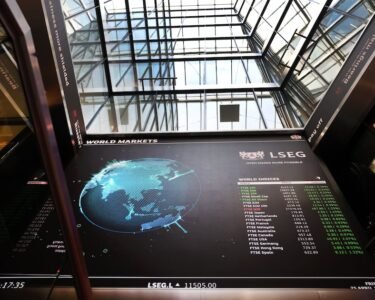The FTSE 100 chalked up a 12th straight day of gains yesterday, and bulls are arguably looking a little tired as we digest a slew of corporate updates this morning. The blue chips marginally in the green, with updates from Barclays among others. Meanwhile, sterling pulled back after hitting a two-year high yesterday.
Weighing on the index, Shell and BP slipped as oil prices fell further. West Texas Intermediate futures dipped below $60 for a two-week low. Oil is on track for the largest April loss due to trade war impacts and eased OPEC+ supply curbs, with production rising next month. Brent has dropped 15 per cent to nearly $63/barrel, its biggest April fall since 1988.
Although we have some generally positive sentiment around trade deals – US commerce secretary Howard Lutnick saying one has been struck already – risk appetite is fragile and some weak China data overnight is perhaps holding back the bulls and weighed on mining stocks with Glencore (production update), Antofagasta and Anglo American among the biggest fallers. China’s manufacturing PMI fell to a 16-month low in April as the bite from tariffs was felt. US consumer confidence yesterday was also very weak.
Barclays hit all the right notes with its quarterly results and shares have lifted more than 3 per cent this morning. This was a strong quarter for Barclays, led by booming trading and wealth management, but the UK consumer business is also chugging along very well with growth of 14 per cent. Like its Wall Street cousins, Barclays benefited from increased trading activity in the quarter off the back of exceptional volatility in financial markets. Banks don’t normally get much credit for big trading quarters, so we will see if this really is a tailwind for the stock against a slowing economy and tough macro backdrop with rate cuts coming?
GSK rose in early trade as the company reassured investors over sector-specific tariff threats and worries about its vaccine business and the impact of the Medicare Part D redesign in the US. While Smith and Nephew shares popped 6 per cent as the medical equipment maker delivered a good performance with sales 3.1 per cent on strong operational performance vs poor China and fx headwinds. Taylor Wimpey shares were down despite a relatively upbeat update and performance broadly in line with expectations, as data showed UK house prices fell. Nationwide reported house prices fell by 0.6 per cent in April, which brought annual house price inflation down to 3.4 per cent, from 3.9 per cent in March. Aston Martin said it will limit imports to the US due to the uncertainty, which is tough for Aston as the US generates about a third of revenue for the firm. For more on all these companies and more, click here.
Across the pond, the S&P 500 has risen for six straight sessions, its longest winning streak since November. Vix down to 25 from a post-liberation day high of 60. Tin hats time? TD Securities and Susquehanna were out yesterday, urging investors to buy some downside insurance – Vix has come right down and I’ve said earlier this week it looked like markets were becoming too complacent.
GM pulled guidance – Stellantis and Mercedes have done the same today. But the White House has talked about destacking auto tariffs – so companies would pay the auto tariff but not also for example, the 25 per cent Mexico tariff on top, except China – parts from there are still subject to an additional 145 per cent.
Pfizer also stuck to guidance but said it had not included any impact from tariffs as it doesn’t know what this might be when it all shakes out. Coca-Cola beat and stuck to guidance with minimal impact from tariffs – shares up 16 per cent YTD on flight to quality/defensives. UPS is not updating FY guidance due to macro events. Plans to cut 20,000 jobs on lower volumes at Amazon.
PayPal reported better than expected earnings but missed on revenue. Venmo revenues surged 20 per cent. Answers some questions about whether Venmo can be a useful revenue driver. Snap fell sharply as it too pulled guidance.
The most interesting update probably came from Visa, which delivered a beat as consumer spending remained resilient, launched a new $30bn buyback. Amazon had a tough day but just about ended flat for the session after reports it was looking to include a tariff surcharge notice on products attracted the ire of the White House.
Today we have earnings from two of the Mag 7 with Meta and Microsoft due to report after the close. Before them, Caterpillar, ADP and Etsy set the scene. Caterpillar has clear China/tariff exposure combined with a US recession and a global growth slowdown narrative. Shares down about 15 per cent YTD.
On the US front, Jolts job openings showed up some hard data catching up with sentiment. Job openings fell to 7.2mn in March and the ratio of job vacancies for every worker counted as unemployed fell to 1.02, a new cycle low…but still not dropping off a cliff in the classic recessionary style.
More important US data today comes in the shape of the PCE price index, which is expected to be flat month-on-month. We are yet to see any real follow-through from the very soft survey data into the hard stuff, but tariffs are yet to really bite.
By Neil Wilson, Investor Strategist at Saxo UK
Companies
Cracks emerge in wealth managers’ investment case
Why investors are underestimating Google’s future
Up in smoke: are tobacco stocks still investable?
Spotting Treatt’s green and red flags
There are also updates from Barclays (BARC), GSK (GSK), Melrose Industries (MRO), Genus (GNS), Aston Martin Lagonda (AML), LBG Media (LBG), Glencore (GLEN), IG Design (IGR), Dalata (DAL), GlobalData (DATA), Videndum (VID) and Aberdeen (ABDN). Click here to find out what’s going on




